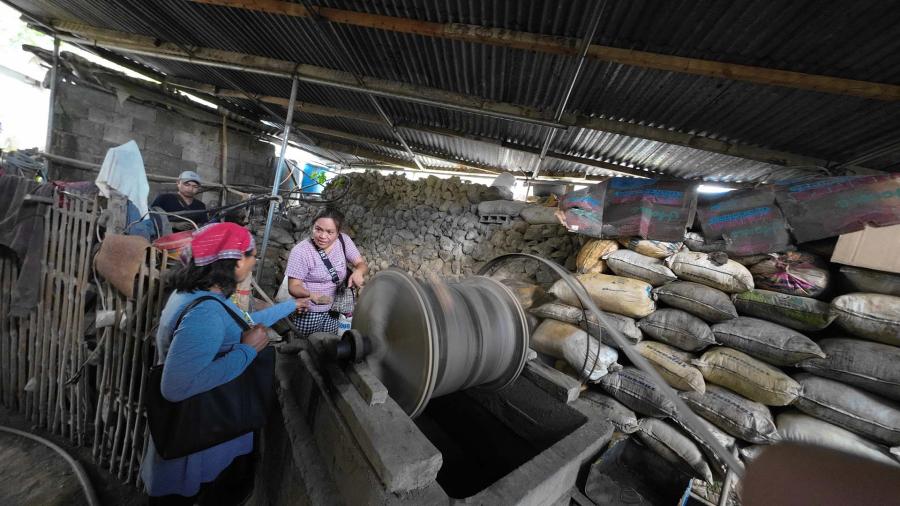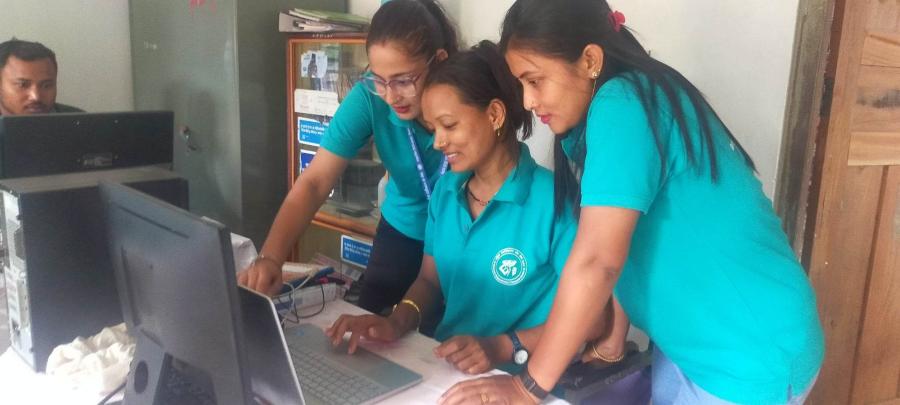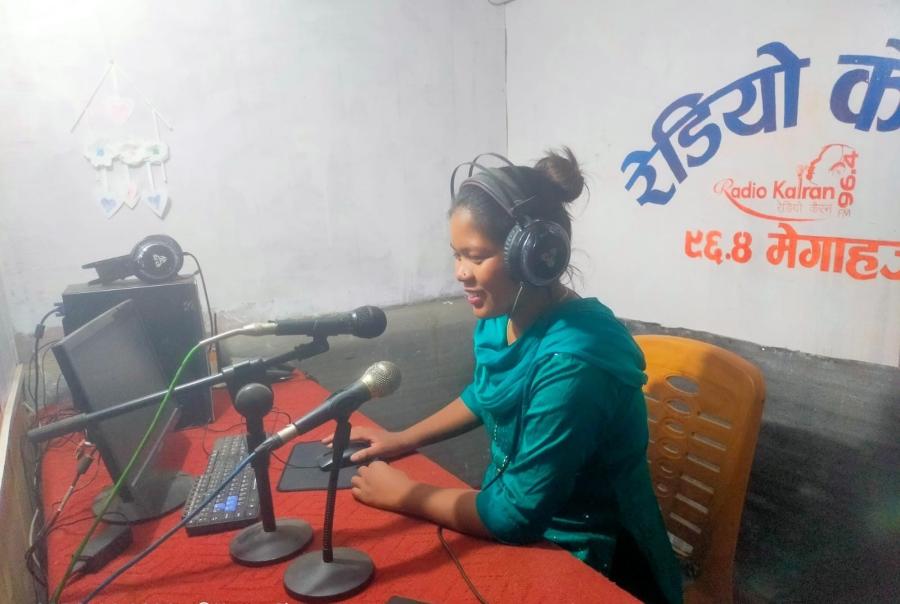Nepal is among the poorest countries in the world. Fifty-one percent of the children suffer from malnutrition and 54 percent of the adults in the country may be stunted as a result of prolonged malnutrition. The population growth rate is 2.6. Infant mortality reaches 30 percent in parts of the Kingdom. Valuable natural resources such as trees and topsoil are rapidly disappearing.
Major development problems include changing the agricultural, health, and sanitation habits of a majority of the 14.5 million people in Nepal. However, to do this new ideas and strategies must address the real needs of the villagers. Moreover, information should be communicated in a form that is easily understood and readily incorporated into daily life.
For new ideas to be accepted, information should come from someone who is already respected by the villagers and understands their situation, can suggest feasible applications, and provide practical reasons for new strategies to be adopted.
Rural primary school teachers are often in a position to communicate innovations. Although thirty years ago there were less than one hundred schools, the recent growth of the public education system has been dramatic. Today, virtually every village has a primary school within walking distance. While overall literacy is less than 20 percent, 87 percent of school age children are currently enrolled in primary school.
Since most children begin working in agriculture when they complete primary school, if not sooner, ideas on planting, seeds, and fertilizers can be introduced in school. Methods of safe food preparation and storage, forest conservation, and population control can also be introduced.
As primary school teachers are generally respected in the village, they can serve as powerful mediators for new ideas to the adult community as well.
Unfortunately, teachers - like 96 percent of the population of Nepal - live in the hills where access to urban centers and government offices generally means walking, sometimes for days. Most teachers read few books or newspapers. Unfortunately, the introduction of new ideas and strategies by primary school teachers presupposes a strong curriculum which includes current, practical information on these topics and well-trained teachers. Traditionally, teachers in remote areas of Nepal have been poorly equipped to tackle these problems. Most teachers have had eight years of education or less. The Radio Education Teacher Training Project (RETT) has been designed to prepare teachers in remote areas to introduce new ideas to their students and communities. Funded by the United States Agency for International Development, the Project uses the radio and written materials to provide training on new ideas and teaching methods.
A ten-month training program developed by staff members of Southern Illinois University and His Majesty's Government's Ministry of Education allows teachers to learn new ideas and methods without leaving their village or school. At the end of the training sequence, teachers complete an examination. If they are successful they become certified teachers and eligible for permanent teaching positions.
Approximately 1,200 teachers have already been trained by this method. An additional 3,500 teachers will be trained in the near future. Five hour-long programs are broadcast weekly for the ten-month training period. Written materials supplement radio broadcasts. Teachers are given their own radios, with two sets of batteries, to use during the 10-month training period. Local shopkeepers have been trained in the repair and maintenance of the radios.
The severe isolation which necessitated the use of distance education also created problems in the development of broadcast materials. It took nearly two years to develop the radio broadcasts and written materials. Teachers were interviewed, as well as supervisors, headmasters, and District Education officers to ascertain areas where help was needed. RETT staff members visited many classrooms testing countless program formats. A group of teachers similar to those in the more remote areas of the country evaluated new materials each week. During the two-year development period, radio tests were conducted throughout Nepal at different altitudes, at different frequencies, at different times of the day and year, to ensure that reception would be good.
What has emerged is an unusual program. In addition to traditional training topics, the curriculum addresses problems confronted by villagers in daily life. Thus, the curriculum includes topics such as:
* How to build a "pit latrine"
* Preventing infectious diseases
* Screening for malnutrition
* Oral rehydration therapy
* Proper methods of food preparation, preservation, and disposal
* Safety and first aid
* The role of local agricultural workers
* Starting and maintaining a plantation
* Vision and hearing screening
The traditional teacher training topics include subjects such as dealing with the special problems of female students, working with non-Nepali speakers in the classroom, and integrating handicapped children into classroom instruction. In each case the concepts are first introduced to the teacher; then games, plays, and other types of lessons are demonstrated in radio skits. These can be replicated in the teachers' own classrooms.
In addition to classroom curricula, each broadcast includes a 15-minute magazine segment for the teacher's information and enjoyment. This segment includes information on festivals, songs written and/or sung by teachers, and popular stories and folk tales, some also written by the teachers. It also includes interviews with popular people and information collected from other donor and ministry offices on new types of seeds and where to get them, special agricultural fairs and how to participate, etc. The teachers favorite section is "The Teacher's Corner." In this segment, the teachers write in questions which the RETT staff read and answer on the air.
Traditional teacher training curriculum has been adapted in a number of important ways. Primary school teachers generally do not support themselves solely by teaching; most tend farms as well. Consequently, farming techniques are of immediate practical concern to the trainees. Equally important are resource conservation, nutrition, and health. Thus, primary school teachers are able to improve their own agricultural and health practices, to teach the children in their classrooms, and to act as extension agents for adults in their community.
Elaborate efforts have been made in the RETT Project to use mass media to meet the needs of the people of Nepal. A few translations from the 25 to 30 letters received each day in the RETT studio from teachers involved in the program testify to its success.
POEM: Priceless Wealth
Oh! How wonderful is our Radio Training.
You get training just lying on your bed.
Education is such a thing.
It cannot be snatched by anyone.
Nor can it be destroyed by fire.
It will stay in the mind.
It will increase if you give it to others.
It can be scattered all over the world.
Just think how wonderful education is!
Lila Nath
Kumari Primary School
Kavre District
SONG: Training by Radio is Good
I was born in Nepal in the lap of the Himalayas and now I am getting
training with the help of radios.
It is very interesting training and if spreads everywhere, hills and
mountains are all receiving it.
Friends, let us try our best for better education.
Up until now we haven't learned how to teach effectively.
Now we are getting training.
Let us teach in better ways.
Thank the Gods. How fortunate we are to have the chance to receive
training while living at home.
Thanks to those who introduced this kind of training in Nepal.
Nara Hari Gautam
Saraswati Lower Secondary School
Gulmi District
The more than 1,500 letters we have received from those participating in the RETT Program has been satisfying. The teachers have taken an active interest in the RETT Program - they view it as their program. The RETT staff are developing a second curriculum; this phase of the project is expected to continue for at least another four or five years, providing training to an additional 15,000 teachers in Nepal.
Article copyright Cultural Survival, Inc.



